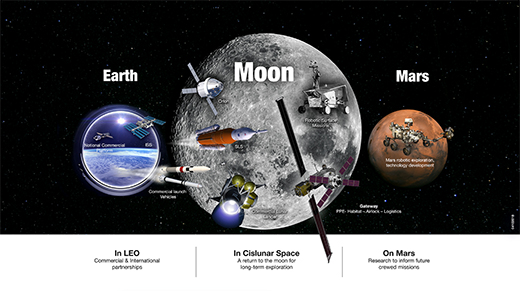Computer science lab director Arslan Munir funded by NASA for space research
Tuesday, Oct. 13, 2020

This graphic, courtesy of NASA, illustrates the spacecraft trajectory optimization research the space agency is seeking from a project involving Kansas State University. | Download this photo.
MANHATTAN — Spacecraft trajectory optimization is a critical aspect of space mission analysis. In recent years, NASA has shown increased interest in applying machine-learning algorithms to improve the performance of trajectory optimization solvers in preparation for a human-tended lunar orbiting platform for crews to visit from earth, to transit to and from the lunar surface, and to depart to and return from Mars.
Optimization of trajectories for spacecraft employing solar-electric propulsion requires the solution of a nonlinear, non-convex mathematical programming problem. For assistance in solving this issue, NASA has awarded $750,000 toward a joint project involving researchers at Wichita State University, Kansas State University and the University of Kansas.
Investigative lead for "Artificial Intelligence-Assisted Spacecraft Trajectory Optimization and Planning" at Kansas State University is Arslan Munir, assistant professor, Michelle Munson-Serban Simu Keystone research faculty scholar and founding director of the Intelligent Systems, Computer Architecture, Analytics and Security Laboratory in the computer science department at the Carl R. Ice College of Engineering.
This project targets development of a new, machine-learning assisted-optimization tool for on-ground mission design. The automated, fast and robust nature of the proposed methodologies makes the tool suitable for onboard implementation as well.
"The plan is to develop various innovative concepts such as using dynamical coordinates in trajectory optimization, a modified-state observer to estimate unmodeled acceleration and use of an artificial neural network for adaptive tuning of planning variables," Munir said.
The proposed research will directly benefit space mission design by incorporating machine learning to reduce the sub-optimality of trajectories computed in a fast and robust manner and to capture unmodeled space environmental effects.
"Considering the increasing significance of space research in recent years," Munir said, "this project will help enable K-State to make significant contributions to a challenging problem of spacecraft trajectory optimization that is paramount for planetary exploration missions.
"It will also increase the recognition and leadership of Kansas State University in space research and will be a step forward in the direction of attaining both university and College of Engineering 2025 goals."

